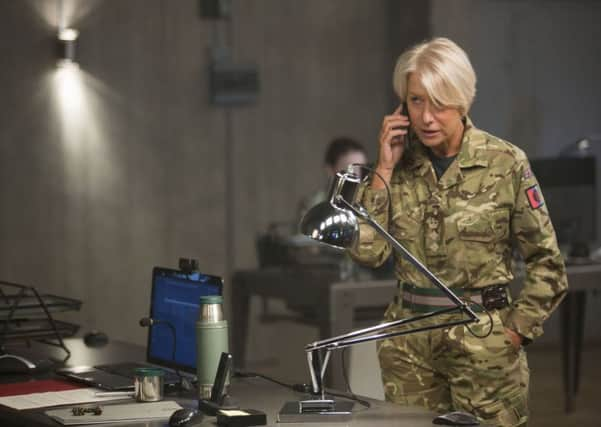Film review: Eye In The Sky | Criminal | Despite The Falling Snow | Our Little Sister


Whenever you see a child playing happily in the street in a war movie you know things aren’t going to end well. The smiling kid without a care in the world is about as hoary as movie tropes get, but that hasn’t stopped Gavin Hood utilising it to build tension into drone warfare thriller Eye in the Sky (***). The film may ostensibly be about the buck-passing machinations of modern combat, especially now that we’re living in an age in which it can be conducted in real time from the safety of remote command centres, but in order to jack up the tension, Hood repeatedly cuts back to the young Kenyan girl (Aisha Takow) he shows hula-hooping away in the film’s opening minutes.
The girl, it turns out, lives in a shantytown in Nairobi that just happens to be the location to which Helen Mirren’s tough-minded army colonel, Katherine Powell, has tracked a radicalised British national suspected of terrorist activity. When she learns her target is planning a suicide bomb attack, she requests a drone strike rather than the planned capture-and-interrogation mission.
Advertisement
Hide AdThe dramatic meat of the film revolves around the political ramifications of this request, with Powell’s boss, Lt Gen Frank Benson (Alan Rickman), putting forth a strong argument for taking out this terrorist cell, and the prime minister’s advisers (led by Jeremy Northam) humming-and-hawing as they worry about the legal, ethical and PR fall-out of action and inaction. That makes for a very talky film, but the value of having the likes of Mirren and Rickman (this was his final role) is their ability to add shading to the moral dilemmas the film’s plotting sets out a little too schematically.
Both Mirren and Rickman do strong, measured work, with Rickman’s character, rather poignantly, having the film’s last word. But the real star of the film is Barkhad Abdi, the chief Somali pirate in Paul Greengrass’s Captain Phillips. Here he plays an anti-terror agent charged with gathering on-the-ground intel. His scenes are full of genuine tension, so it’s a shame Hood (who made the Oscar-winning Tsotsi and quickly forgotten Rendition) resorts to upping the stakes further by placing the aforementioned street child directly in the firing line of the proposed drone strike. Adding an extra layer of emotional manipulation to an already highly charged situation, it’s a cheap shot, if annoyingly effective in the moment.
Effective only in as much as the title serves as its own review, Criminal (**) could have been an entertaining throwback to the preposterous action films of the 1990s had it not been made with such a po-faced commitment to mimicking the aesthetics of the Bourne movies. Indeed, it’s rare that one longs for the brain-deadening delirium of Michael Bay, but given this was written by the same team behind The Rock, it’s hard not to wonder if someone with an appreciation for his level of outlandishness could have made it into a similarly trashy action treat.
Revolving around a psychopath (Kevin Costner) who undergoes a brain transplant so the CIA can retrieve information about a cyber-terrorism plot from a recently killed agent (a brief cameo for Ryan Reynolds), the ludicrous premise – I swear it’s genuine – is a silly enough mash-up of Face/Off and mid-period Bond to work as goofy, brain-off entertainment. Unfortunately Israeli director Ariel Vroman, who made the drearily grim serial killer film The Iceman, has no sense of humour and seems to have instructed his veteran cast – among them Tommy Lee Jones and Gary Oldman – to take it all seriously. At least Costner seems to be having fun, particularly as his psycho’s newly implanted memories start making him more human. The film as a whole has no sense of its own stupidity, however, making it hard to go along for the ride.
As much of a misfire as Criminal is, it’s preferable to Despite the Falling Snow (*), a dreary, incompetently plotted and flatly directed Cold War melodrama about an American artist who travels to Moscow to find out what really happened to the aunt who helped her beloved uncle defect 30 years earlier. The film jumps back and forth between the 1960s and the 1990s, with Mission: Impossible – Rogue Nation star Rebecca Ferguson playing both the protagonist and, in the flashback scenes, her aunt. Why she’s the spitting image of her aunt is one of the numerous nonsensical mysteries writer/director Shamim Sarif – adapting her own novel – doesn’t bother trying to resolve.
Much better is Our Little Sister (****), the new film from Koreeda Hirokazu. The Japanese director has drawn comparisons with Mike Leigh thanks to his interest in chronicling family dysfunction, but his method – in films such as Still Walking and Like Father, Like Son – is less histrionic and less prone to caricature, exploring as it does the foibles of modern life in nuanced and gently illuminating ways. This time he zeroes in on three sisters still living together as adults in the family home they inherited from their grandmother following the disintegration of their parents’ marriage. When news of their father’s death reaches them, they decide to go to the funeral where they meet their teenage half-sister for the first time and impulsively invite her to live with them. What follows is a deeply humane look at the way the shards of a broken family unit can be reconfigured into something warm, positive and functional.